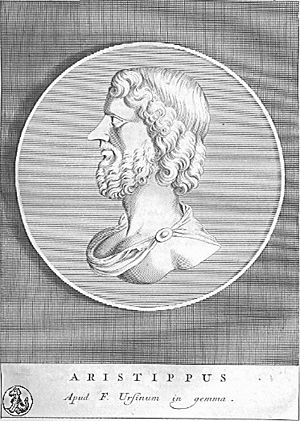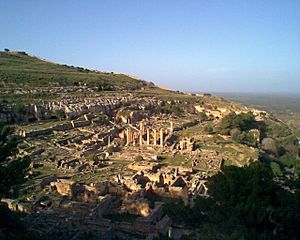Aristippus facts for kids
Quick facts for kids
Aristippus
|
|
|---|---|
 |
|
| Born | c. 435 BCE |
| Died | c. 356 BCE (aged c. 78 – 79) |
| Era | Ancient Greek philosophy |
| Region | Western philosophy |
| School | Cyrenaic school |
|
Main interests
|
Hedonism, Epistemology |
|
Notable ideas
|
Hedonism |
Aristippus of Cyrene (born around 435 BCE, died around 356 BCE) was an important Greek philosopher. He started a way of thinking called the Cyrenaic school of philosophy. Aristippus was a student of the famous philosopher Socrates. However, he had different ideas from his teacher.
Aristippus believed that the main goal in life was to find pleasure. This idea is known as ethical hedonism. He taught that people should enjoy life by making situations work for them. He also believed it was important to stay in control, whether things were good or bad. His most famous saying was: "I possess, I am not possessed." This meant he wanted to enjoy things without letting them control him. His daughter, Arete, and her son, Aristippus the Younger, helped to organize his ideas. They made the Cyrenaic school of philosophy well-known.
Aristippus's Life Story
Aristippus was born in a city called Cyrene around 435 BCE. This city was in ancient Libya. He traveled to Greece to attend the Olympic Games. There, he heard about Socrates and really wanted to meet him. So, Aristippus went to Athens and became Socrates' student.
Even though he learned from Socrates, Aristippus had his own ideas. He became very interested in pleasure. This led him to focus on ethical hedonism. Because his ideas were different from Socrates, Aristippus looked for other opportunities. He went to the court of a ruler named Dionysius I of Syracuse. There, Aristippus lived a fancy life and continued to seek out pleasures.

Aristippus was also the first of Socrates' students to charge money for his lessons. Sometimes, he would send money to Socrates. But Socrates often sent it back because he saw it as an insult. Aristippus once told Socrates that he lived in a foreign land to avoid getting involved in the politics of his hometown.
Because he spent his life pursuing pleasure, Aristippus often had disagreements with other philosophers. Socrates and his other students sometimes criticized him. Despite this, Aristippus kept sharing his ideas. He taught his philosophy to his daughter, Arete. She then taught it to her son, Aristippus the Younger. His grandson helped to create a system for the Cyrenaic school of philosophy. In his later years, Aristippus returned to Cyrene. He lived out his life enjoying himself until he died at about 79 years old.
A writer named Vitruvius tells a story about Aristippus. Once, Aristippus was in a shipwreck and ended up on the coast of Rhodes. He saw geometric shapes drawn on the sand. He told his friends, "Let's be cheerful, because I see signs of people!" He went to the city of Rhodes and found a gymnasium. There, he talked about philosophy. People were so impressed that they gave him gifts. These gifts helped him and his friends get new clothes and other things they needed. When his friends wanted to go home, they asked him what message he wanted them to take back. Aristippus told them to say: "Children should be given knowledge and skills that can stay with them, even if they are in a shipwreck."
Aristippus's Philosophy
Aristippus's main ideas were all about hedonism. He had noticed that Socrates enjoyed things like parties and wine. This made Aristippus think more deeply about pleasure. He came to believe that pleasure was the greatest good in life. However, he also thought it was very important not to let pleasure control you. This is why he famously said, "I possess, I am not possessed."
Aristippus taught his followers not to harm others. He also warned that seeking pleasure should be balanced with self-control. After developing his ideas, Aristippus started the Cyrenaic school of philosophy. Here, his ideas were taught and further developed by his daughter, Arete, and his grandson, Aristippus the Younger.
Even though Aristippus focused on pleasure, his ideas often faced criticism. Socrates and his other students disagreed with him. While Socrates enjoyed some pleasures, he believed that being good and having strong morals (virtue) was more important than pleasure. Philosophers like Plato and Xenophon thought Aristippus had moved too far from Socrates' teachings. Aristotle even called him a "sophist," which was a term for someone who used clever but misleading arguments.
One famous story shows this disagreement. In Plato's book Phaedo, it says that Aristippus was not there when Socrates died. Instead, he was in Aegina, which was known as a place for enjoyment. This was seen as a sign that Aristippus cared more about pleasure than about his teacher.
Many stories about Aristippus come from a writer named Diogenes Laërtius. Diogenes said that Aristippus tried to make situations fit him, instead of changing himself to fit situations. He also said that Aristippus handled every part of life with grace. Another story tells of Aristippus being criticized for enjoying physical pleasures. He replied, "It's not about avoiding pleasures that is best, but being able to control them without ever being defeated."
Aristippus's Writings
Sadly, none of Aristippus's own writings have survived to today. Some ancient writers said he wrote many books. However, others claimed he never wrote anything at all. Some letters that were said to be from him are now thought to be fakes.
One book, called On Ancient Luxury, was once thought to be by Aristippus. But it mentions a philosopher named Theophrastus, who lived after Aristippus. So, it's likely that someone else wrote it and used Aristippus's name. This book was probably full of stories about philosophers.
See also
 In Spanish: Aristipo para niños
In Spanish: Aristipo para niños
 | Lonnie Johnson |
 | Granville Woods |
 | Lewis Howard Latimer |
 | James West |

